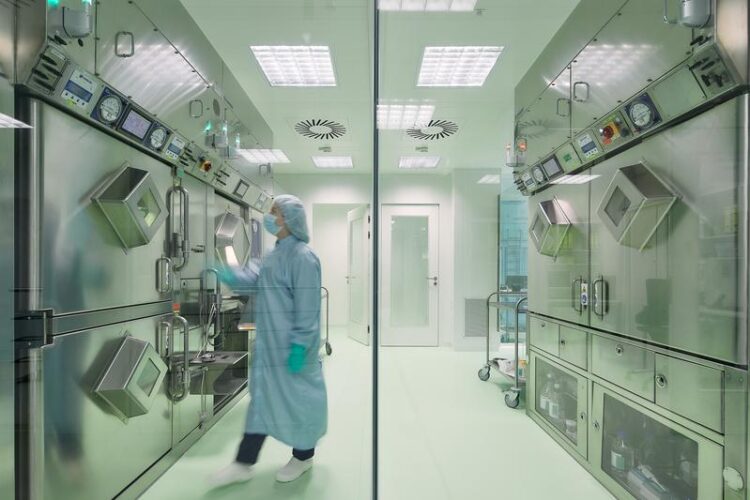University Hospital Tübingen cooperates with ImaginAb and is Europe’s first center for the production of radiolabeled CD8 minibodies.
The Preclinical Imaging and Radiopharmacy Department of the University Hospital Tübingen and ImaginAb, a global market leading biotech company, are cooperating in the field of cancer immunotherapy. Under the terms of the collaboration, ImaginAb will provide Tübingen University Hospital with its CD8 ImmunoPET agent who will radioactively label these so-called CD8 minibodies for non-invasive imaging of a specific group of immune cells and make them available for clinical trials to visualize cytotoxic CD8+ T cells during cancer immunotherapy throughout Europe. The use of imaging techniques using the minibodies plays a key role in selecting and guiding appropriate cancer therapy and is a valuable tool in determining whether immunotherapy is appropriate for the patient.
Cytotoxic CD8+ T cells play a central role in immune defense as they can directly destroy tumor cells. Checkpoint inhibitor-based immunotherapies activate these endogenous T cells so that they can attack the tumor cells. However, since not every tumor patient responds to these therapies, innovative methods are needed to select a therapy that is appropriate for the patient, to predict a therapy response, and to make a timely switch in case of therapy failure. Here, ImaginAb’s radiolabeled CD8 minibodies could support medical diagnostics, as they have a high affinity to the human CD8 receptor on cytotoxic CD8+ T cells. The radiolabeled minibodies bind to the human CD8 receptor and can be detected non-invasively in the human body using an imaging technique, positron emission tomography (PET), before and during immunotherapy. Current studies indicate that the number and distribution of CD8+ cells present in tumors is a factor that is important for the success of immunotherapy.
Current clinical trials are investigating the extent to which the use of CD8 ImmunoPET can be used to determine the suitability of potentially stressful and very costly therapies for an individual patient, or whether a response to therapy can be detected early enough to save valuable time and resources in the fight against cancer, and possibly to apply more appropriate forms of therapy to give patients a better life. In the future, CD8 ImmunoPET may eliminate the need for painful biopsies for patients.
Prof. Dr. Bernd Pichler, Dean of the Medical Faculty of the University of Tübingen and Director of Preclinical Imaging and Radiopharmacy at the University Hospital Tübingen, is convinced of the partnership: “With ImaginAb, we have gained a partner that is internationally pioneering in the field of immune imaging technology. Coupled with our expertise in translational imaging and radiopharmacy, we hope to make a positive contribution to improving cancer immunotherapies by means of clinical trials.”
The CD8 minibodies are radiolabeled in Radiopharmacy under a manufacturing license and compliance with good manufacturing practice (GMP) rules. The regulations guarantee strict quality assurance in the production of pharmaceuticals. Batches of the radiolabeled CD8 minibody have recently been delivered by Radiopharmacy at the University Hospital Tübingen for pharmaceutical company-sponsored clinical trials throughout Europe. At the Department of Nuclear Medicine and Clinical Molecular Imaging (Prof. la Fougère), the first clinical trial with CD8 minibodies in Germany is being set up. The partnership with ImaginAb thus benefits the Tübingen institution as well as the studies of the German Consortium for Translational Cancer Research (DKTK) and the iFIT Cluster of Excellence.
Initial study data from clinical patients indicate that the CD8 minibodies can successfully capture CD8+ T cells in tumor and lymphoid tissue. Another advantage of CD8 minibodies is their small size. They are smaller than antibodies and therefore accumulate more quickly in the tumor. As a result, the PET examination can take place as early as 24 hours after administration of the radiolabeled minibodies.
Ian Wilson, CEO of ImaginAb, said of the collaboration: “We believe our CD8 ImmunoPET Imaging platform, offer real potential to accelerate the clinical development of next-generation immunotherapeutics and allows physicians to make smarter, more timely decisions on patients care paths. With Tübingen, we have gained an excellent collaboration partner that will significantly help us in the implementation of clinical trials in Europe and realize our vision of transforming patient care.”
Medienkontakt







